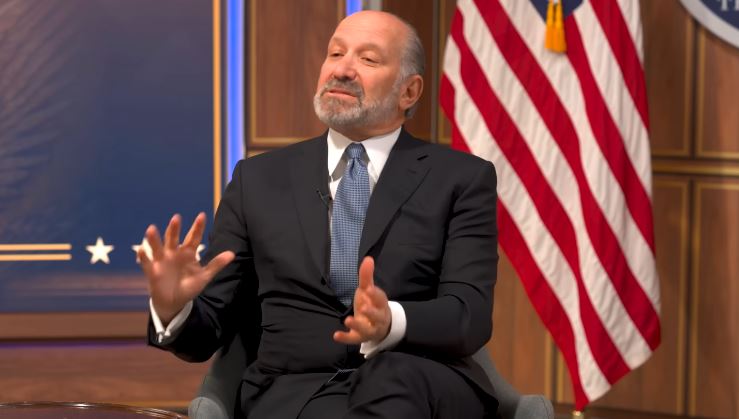Howard Lutnick’s extraordinary financial story isn’t just about accumulating wealth; it’s also about perseverance, change, and a string of extraordinarily wise choices made under duress. Lutnick’s longstanding leadership at Cantor Fitzgerald is largely responsible for his estimated $2 billion to $4 billion net worth as of early 2025. Over the course of his decades-long tenure, he has not only accumulated personal wealth but also guided one of the most significant financial services companies on Wall Street through some of its most difficult times and brought it back into the public eye.
Lutnick was at the center of tragedy and responsibility after the events of September 11, 2001, when Cantor Fitzgerald lost 658 of its employees in the World Trade Center’s North Tower. Amazingly, he was able to lead the company‘s rebirth in addition to keeping it afloat. His charitable response—particularly through the Cantor Fitzgerald Relief Fund, which donates profits from September 11th to impacted families annually—was especially creative. This tactic, which combined leadership and compassion, came to define his public persona.
| Attribute | Details |
|---|---|
| Full Name | Howard William Lutnick |
| Born | July 14, 1961, Jericho, New York |
| Education | Haverford College (BA, Economics) |
| Occupation | Chairman and CEO of Cantor Fitzgerald |
| Net Worth | $2–$4 billion (as of 2025) |
| Known For | Rebuilding Cantor Fitzgerald after 9/11 |
| Current Role | U.S. Secretary of Commerce (confirmed Feb 2025) |
| Philanthropy | Cantor Fitzgerald Relief Fund, Haverford College donations |
| Real Estate | Properties in Bridgehampton, Washington D.C., and New York |
| Reference | Investopedia Profile |
Lutnick’s public image has significantly grown outside of Wall Street in recent years. He was the target of both political and economic criticism after being appointed Secretary of Commerce in early 2025 under Donald Trump’s administration. His corporate sensibilities now influence national trade decisions, a development that feels remarkably similar to the late-career turns made by individuals such as Michael Bloomberg, who were tasked with promoting American economic interests overseas.
Using cutting-edge analytics and trading technology platforms such as eSpeed, which he invented, Lutnick turned Cantor Fitzgerald from a conventional bond broker into a major force in the digital era. His estimated 60% stake still brings in hundreds of millions of dollars a year. Official disclosures indicate that he received more than $300 million in compensation in 2024. Lutnick’s story provides early-stage entrepreneurs with more than just motivation; it demonstrates how strategy, scalable innovation, and survival can all work together to create legacy and impact at the same time.

Lutnick expanded Cantor’s real estate presence through strategic alliances with BGC Partners and Newmark Group. Although these actions were profitable, they also led to vertical integration, which is the blending of asset management and trading platforms. Elon Musk’s portfolio is structured similarly to this layered growth, with each company supporting and enhancing the others. However, Lutnick maintains an incredibly private façade in contrast to Musk’s high-voltage public persona.
Both on Capitol Hill and behind boardroom doors, his influence is felt. Given that the company is privately held, Lutnick’s net worth is especially impressive, even though Treasury Secretary Scott Bessent has a healthy $500 million valuation. Few CEOs have such a dominant position in contemporary finance, especially in such a cutthroat industry.
Lutnick provided aid to families directly during the pandemic and after natural disasters like Hurricane Sandy and the tornado in Moore, Oklahoma, frequently in the form of $1,000 debit cards. These actions were extremely personal reactions influenced by his own loss history rather than merely PR gimmicks. After losing both parents while in college and almost his entire company on 9/11, he honed his humanitarian instincts.
Additionally, Lutnick’s story touches on more general discussions of wealth ethics. The size of the assets held by Commerce Department appointees has drawn criticism in recent months. Lutnick owns more than 800 companies, from luxury real estate to trading desks. He is considered to be in the upper echelons of private wealth due to his rumored $100 million Hamptons estate and $44 million home atop NYC’s Pierre Hotel.
However, Lutnick has significantly improved public perception by incorporating philanthropy into his business model. His leadership style is evident in his work during 9/11 anniversaries and his consistent financial support of the Relief Fund. Restoring lives, making investments in the future, and respecting the past are more important than merely making money.
Because of Lutnick’s rise from Wall Street titan to Cabinet official, the intersection of wealth, power, and responsibility has become more apparent in American politics. Similar to how BlackRock’s Larry Fink subtly changed the financial industry or how Jamie Dimon garners international attention with every statement, Lutnick’s ascent portends a time when private capital will increasingly influence public policy.
Every policy change since the beginning of his public service career has been handled by Lutnick with remarkable clarity. His management style frequently reflects a centrist pragmatism that cuts across party lines, even though he was appointed by the Republican Party. In a time of extreme polarization, his ability to maintain elite financial status and bipartisan credibility is especially noteworthy.


